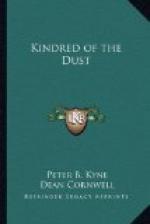He strode out to the gate where his father’s chauffeur waited with the limousine. “Take the car home,” he ordered, “and as you pass through town stop in at the Central Garage and tell them to send a closed car over to me here.”
The chauffeur looked at him with surprise but obeyed at once. By the time the hired car had arrived Nan and her child were ready, and just before locking the house Nan, realizing that they would not return to the Sawdust Pile until long after nightfall, hauled in the flag that floated over the little cupola; and for the second time, old Hector, watching up on the cliff, viewed this infallible portent of an event out of the ordinary. His hand trembled as he held his marine glasses to his blurred eyes and focussed on The Sawdust Pile, in time to see his son enter the limousine with Nan Brent and her child—and even at that distance he could see that the car in which they were departing from the Sawdust Pile was not the one in which Donald had left The Dreamerie. From that fact alone The Laird deduced that his son had made his choice; and because Donald was his father’s son, imbued with the same fierce high pride and love of independence, he declined to be under obligation to his people even for the service of an automobile upon his wedding day.
The Laird stood watching the car until it was out of sight; then he sighed very deeply, entered the house and rang for the butler.
“Tell Mrs. McKaye and the young ladies that I would thank them to come here at once,” he ordered calmly.
They came precipitately, vaguely apprehensive. “My dears,” he said in an unnaturally subdued voice, “Donald has just left the Sawdust Pile with the Brent lass to be married. He has made his bed and it is my wish that he shall lie in it.”
“Oh, Hector!” Mrs. McKaye had spoken quaveringly. “Oh, Hector, dear, do not be hard on him!”
He raised his great arm as if to silence further argument. “He has brought disgrace upon my house. He is no longer son of mine and we are discussing him for the last time. Hear me, now. There will be no further mention of Donald in my presence and I forbid you, Nellie, you, Elizabeth and you, Jane, to have aught to do wie him, directly or indirectly.”
Mrs. McKaye sat down abruptly and commenced to weep and wail her woe aloud, while Jane sought vainly to comfort her. Elizabeth bore the news with extreme fortitude; with unexpected tact she took her father by the arm and steered him outside and along the terrace walk where the agonized sobs and moans of her mother could not be heard—for what Elizabeth feared in that first great moment of remorse was a torrent of self-accusation from her mother. If, as her father had stated, Donald was en route to be married, then the mischief was done and no good could come out of a confession to The Laird of the manner in which the family honor had been compromised, not by Donald, but by his mother, aided and abetted by his sisters! The Laird, now quite dumb with distress, walked in silence with his eldest daughter, vaguely conscious of the comfort of her company and sympathy in his hour of trial.




